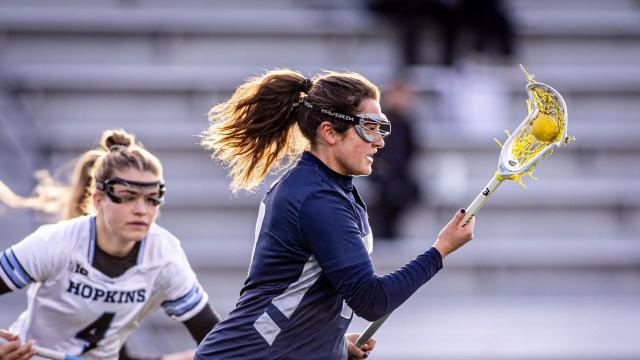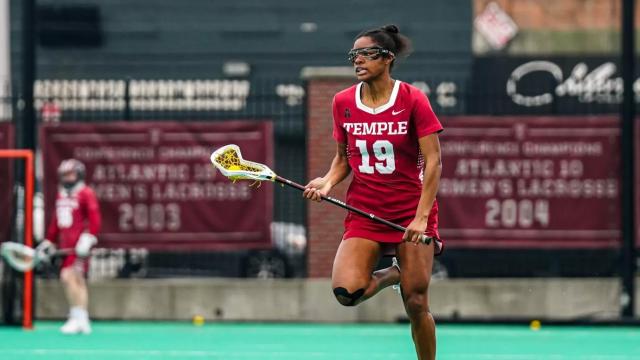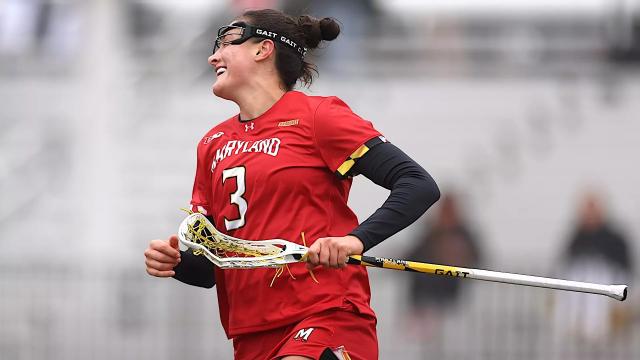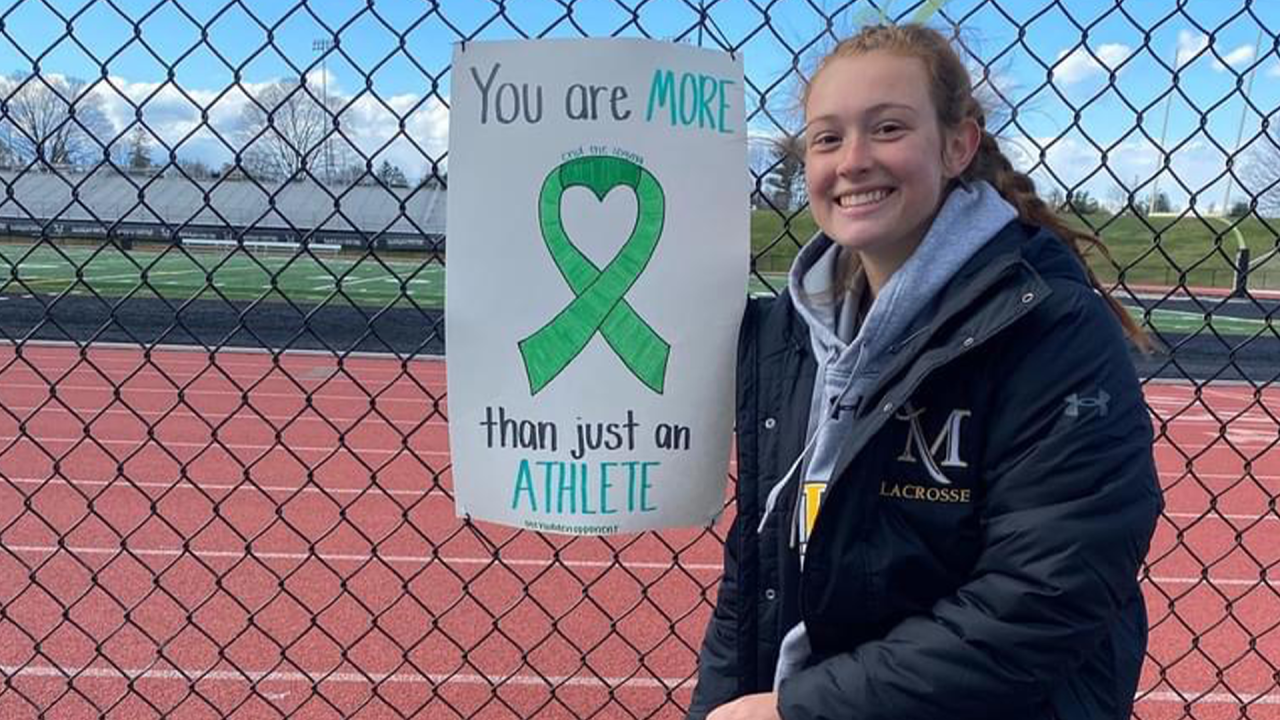
Mental Health Awareness with The Hidden Opponent: Millersville's Maya Porrecca
USA Lacrosse is partnering with The Hidden Opponent throughout May, shining a light on student-athletes across the country doing their part to end the stigma surrounding mental health.
The Hidden Opponent is a non-profit and advocacy group that raises awareness about student-athlete mental health. With a network of hundreds of Campus Captains, The Hidden Opponent is making a significant impact across all sports.
Maya Porrecca is a senior defender for Millersville and a Campus Captain who was inspired by Victoria Garrick-Brown’s TED talk on mental health and wants to be a great resource to her teammates who may be struggling. Learn more about Maya below, and head to USA Lacrosse’s Instagram for a look at her day.
Who is Maya Porrecca? What is your lacrosse story?
I'm going into my senior year at Millersville University and I'm studying sports administration with an athletic coaching minor. My goal is to be a collegiate lacrosse coach. I started playing lacrosse super young, as soon as there was a league for me to play in. My mom was a lacrosse coach at the college level, and then at the high school level, and has been an official. Lacrosse has always been part of my life. I never questioned it and I can't imagine my life without lacrosse. It's just kind of been something that's a part of me. Lacrosse gave me some of my best friends, and great relationships and helped me grow as a person. I want to impact the upcoming generations because I have had such a good experience with the sport and growing with it.
What are your favorite parts of playing lacrosse?
For every sport, there's going to be that relationship building with teammates and even coaches as mentors. One thing I love about lacrosse is how skillful it is, especially on the women's side. I love watching a play unfold and for it to be executed perfectly, like from a caused turnover down the field, watching it transition into a goal is the best thing ever. I get chills thinking about it. I'm a defender so I don't get to do the goal-scoring, but I watch my teammates execute that perfectly.
How did you make your way to Millersville?
I was going through the recruiting process during the peak of COVID, so it was a little challenging. I had my eye on crazy amounts of schools. I wasn't sure where I wanted to go. My mom actually played at Millersville. It was always a thought in my head, but I was like, ‘No, I'm not going to do that.’ I was a 16-year-old. No one wants to admit that they’re like their parents. Once I got to campus and talked to the coaches, I saw myself being successful there. It's not too far from home, so I knew that my parents could get to the games and support me in that way. Once I got to campus, it all proved correct. It was amazing.
How did you learn about Campus Captains and the Hidden Opponent? Why did you feel like this was right for you?
I just stumbled upon Hidden Opponent on Instagram. It came up on my Explore page and it looked pretty cool. I saw that they were taking applications for Campus Captains, so I read their summary about it, bringing mental health initiatives to your college campus. I applied in the summer of 2021 before my freshman year, and I got accepted. I didn't know much about the organization, but within the first couple weeks, they put you through an orientation, and you get to learn about the organization and other campus captains within your division. Then, I watched Victoria Garrick Brown's TED talk, and that inspired me. I was like, ‘Wow, this is so real, raw and genuine. I sometimes go back and watch that video because it's so inspiring and relatable for a lot of student-athletes.
I've had three awareness games for lacrosse over the past three years. We host monthly meetings throughout the fall and spring semesters where we talk about different mental health topics. We’ve talked about stress relief exercises, substance abuse in athletes, creating a community on campus and engaging different athletes. Our engagement is starting to grow, specifically with men's sports.
When you watch that TED talk, what specifically pick up on?
What was mainly inspiring about it was that she wasn't afraid to talk about it at that moment. I'm sure it took a while for her to get to that point. It helped normalize the topic of mental health, because a lot of people are afraid to admit that they're struggling. The fact that she was able to get up in front of a crowd and put that on the internet for people to see that, ‘Hey, this is normal.’ I thought that was crazy in a good way.
How has your mental health journey been?
I don't struggle too much with mental health concerns. I've seen more of it secondhand. Plenty of people close to me have struggled with mental health issues, and I want to be the best support system I can be. That's what motivated me to learn more about it. I want to be a good friend, a good teammate, all of the above. Being involved with Hidden Opponent resources and learning more has uplifted me.
How unique is the struggle that college athletes have with mental health?
I think it’s misunderstood, and to an extent, ignored. Administrators and officials recognize that this is a problem. They've seen the statistics, but no one's taking steps to make change happen. Many athletes go through struggles, but what they should learn is that it can be so much better when the resources are available and you can take advantage of them. The first step of recognizing your problem and reaching out for help. Many college athletes ignore issues because they sweep it under the rug. It's a matter of swallowing the pride and being open to being vulnerable.
What do you see in the future for your involvement with Campus Captains, and of the progress on mental health in general?
As more professional athletes and Olympic athletes step up and speak out, it's becoming more accepted. It will just become a trickle-down effect. The awareness is growing at a great rate, but speaking up and getting help is getting a little bit slower. I am still positive about that — that it will continue to increase and people will get the help that they need. I'm excited about the growth that we’ve seen so far at Millersville. In the next year, I would like to grow the engagement on my campus, specifically. I want to grow a presence to create a lasting impact and look out for those future classes coming through.
Matt Hamilton
Matt Hamilton is the Content Marketing Manager at USA Lacrosse, having served as a staff writer for four years. He's a Baltimore native who loves the Orioles and Ravens, even if they let him down in the last year. He likes chicken tenders and Shirley Temples and sick views. He also loves writing about lacrosse.
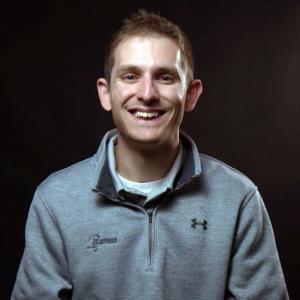
Categories
Tags
Related Articles
